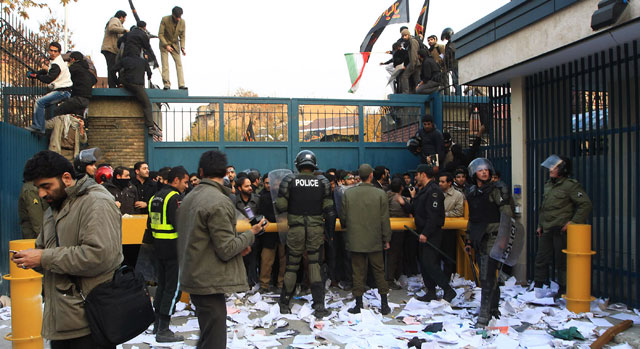British embassy in Iran to re-open amid Iraq crisis
Shared interest in confronting Isis militants warms diplomatic relations between West and Iran

A free daily email with the biggest news stories of the day – and the best features from TheWeek.com
You are now subscribed
Your newsletter sign-up was successful
Foreign Secretary William Hague has said the British embassy in Iran will re-open for the first time in three years.
The embassy, based in the capital city of Tehran, was closed after hundreds of protesters stormed the building in 2011. Diplomats working at the Iranian embassy in London were subsequently expelled.
Hague told MPs this morning that "the circumstances were right" for the embassy in Tehran to open its doors again.
The Week
Escape your echo chamber. Get the facts behind the news, plus analysis from multiple perspectives.

Sign up for The Week's Free Newsletters
From our morning news briefing to a weekly Good News Newsletter, get the best of The Week delivered directly to your inbox.
From our morning news briefing to a weekly Good News Newsletter, get the best of The Week delivered directly to your inbox.
"In a written statement, Mr Hague said the UK embassy will re-open 'as soon as practical arrangements are made' as a sign of 'increasing confidence' in the state of relations between the two countries," the BBC reported.
The election of a new Iranian president, Hassan Rouhani, and an interim deal over Iran's nuclear programme has since warmed diplomatic relations. In October, both countries appointed a non-resident "charge d’affaires" to work towards reopening the embassies.
Now the two countries have been pushed together by the crisis in Iraq, says the Financial Times. Contact between the West and Iran has gathered pace through their shared interest in confronting militants from the Islamic State of Iraq and Syria (Isis), with Hague reportedly speaking to Iran's foreign minister over the weekend.
Jack Straw, former Labour foreign secretary, told the FT: "The crisis in Iraq underlines the need for us to build up relations with the government of Iran as quickly as possible. They were a reliable ally with respect to Afghanistan and it happens that their interest in promoting a stable Iraq coincides with ours."
A free daily email with the biggest news stories of the day – and the best features from TheWeek.com
Around 400 British nationals or citizens with links to the UK are believed to be fighting in Syria and Hague believes some are "inevitably" fighting in Iraq.
No 10 Downing Street officials have confirmed that Britain has offered "counter-terrorism advice" to Baghdad and would offer assistance if the US decided to take any action in Iraq. However, they have ruled out sending military support to the Iraqi regime.
-
 Antonia Romeo and Whitehall’s women problem
Antonia Romeo and Whitehall’s women problemThe Explainer Before her appointment as cabinet secretary, commentators said hostile briefings and vetting concerns were evidence of ‘sexist, misogynistic culture’ in No. 10
-
 Local elections 2026: where are they and who is expected to win?
Local elections 2026: where are they and who is expected to win?The Explainer Labour is braced for heavy losses and U-turn on postponing some council elections hasn’t helped the party’s prospects
-
 6 of the world’s most accessible destinations
6 of the world’s most accessible destinationsThe Week Recommends Experience all of Berlin, Singapore and Sydney
-
 Will increasing tensions with Iran boil over into war?
Will increasing tensions with Iran boil over into war?Today’s Big Question President Donald Trump has recently been threatening the country
-
 Epstein files topple law CEO, roil UK government
Epstein files topple law CEO, roil UK governmentSpeed Read Peter Mandelson, Britain’s former ambassador to the US, is caught up in the scandal
-
 Iran and US prepare to meet after skirmishes
Iran and US prepare to meet after skirmishesSpeed Read The incident comes amid heightened tensions in the Middle East
-
 Which way will Trump go on Iran?
Which way will Trump go on Iran?Today’s Big Question Diplomatic talks set to be held in Turkey on Friday, but failure to reach an agreement could have ‘terrible’ global ramifications
-
 Israel retrieves final hostage’s body from Gaza
Israel retrieves final hostage’s body from GazaSpeed Read The 24-year-old police officer was killed during the initial Hamas attack
-
 China’s Xi targets top general in growing purge
China’s Xi targets top general in growing purgeSpeed Read Zhang Youxia is being investigated over ‘grave violations’ of the law
-
 Panama and Canada are negotiating over a crucial copper mine
Panama and Canada are negotiating over a crucial copper mineIn the Spotlight Panama is set to make a final decision on the mine this summer
-
 Iran unleashes carnage on its own people
Iran unleashes carnage on its own peopleFeature Demonstrations began in late December as an economic protest